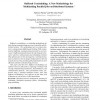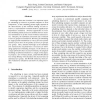874 search results - page 43 / 175 » On Advantages of Grid Computing for Parallel Job Scheduling |
CORR
2007
Springer
13 years 7 months ago
2007
Springer
In Grids scheduling decisions are often made on the basis of jobs being either data or computation intensive: in data intensive situations jobs may be pushed to the data and in co...
EUROPAR
2004
Springer
14 years 1 months ago
2004
Springer
Scheduling parallel jobs has been an active investigation area. The scheduler has to deal with heterogeneous workloads and try to obtain throughputs and response times such that en...
GRID
2008
Springer
13 years 8 months ago
2008
Springer
For data analysis or simulations (e.g. in particle physics) single users submit hundreds or thousands of jobs to the Grid. This puts a new burden on the users side - keeping an ov...
IPPS
2000
IEEE
14 years 3 days ago
2000
IEEE
Buffered coscheduling is a scheduling methodology for time-sharing communicating processes in parallel and distributed systems. The methodology has two primary features: communica...
CCGRID
2005
IEEE
14 years 1 months ago
2005
IEEE
Knowledge about the workload is an important aspect for scheduling of resources as parallel computers or Grid components. As the scheduling quality highly depends on the character...


